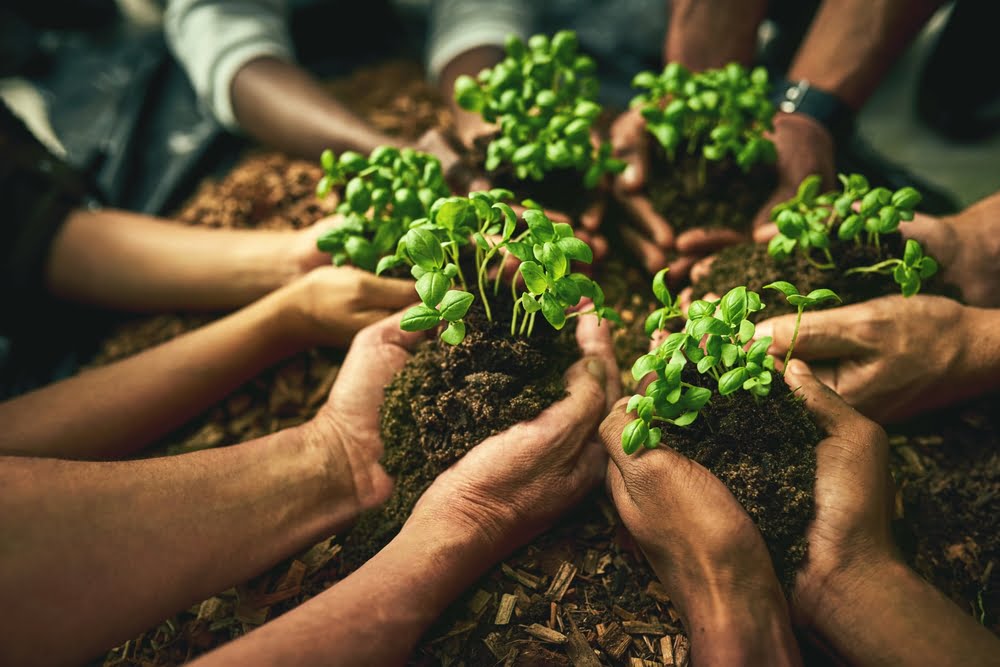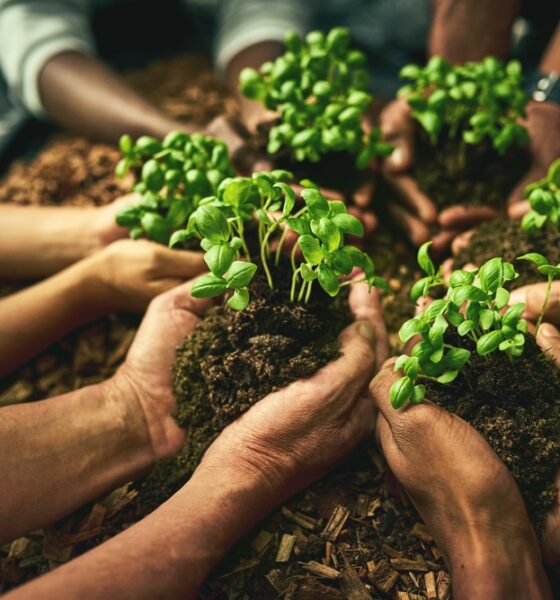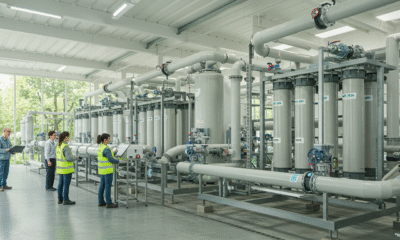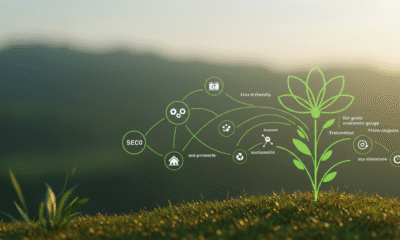

Environment
Maximizing Yield: Environmental Benefits of Salt Tolerant Farming
There are many industries that are being shaped by demand for sustainability. The agricultural sector is among them.
The American Farm Bureau Federation has detailed some of the many things that farmers are doing to embrace sustainability these days. Over the last five years, they have increased their investments in renewable energy by 132%.
However, there are a number of other things that they have only recently started doing to embrace sustainability. One option we talked about is eco-friendly free range farming.
One of the newest changes they have made is investing in salt tolerant farming. This new practice is both better for the planet and results in greater crop yields.
Salt Tolerant Farming Becomes a New Way for Farmers to Embrace Sustainability
Ever think about how our food grows? Especially when the earth it springs from is as salty as a sea breeze? Have you thought about what farmers need to do to grow food in these areas without harming the planet?
Farmers worldwide grapple with this issue, working against saline soils that stunt crop growth and slash yields. But imagine if we could turn the tables on these harsh conditions.
Welcome to the world of Salt Tolerant Crop farming – a game-changer in global agriculture. This isn’t just another green-thumb fad; it’s an innovative solution for feeding our ever-growing population while rehabilitating salt-ravaged lands.
This post uncovers secrets beneath soil salinity, its impacts on crops, and strategies to mitigate such stress through sustainable farming practices. We’ll explore breakthroughs in salt-tolerant rice production and other resilient cash crops redefining profitability under high salinity levels.
Are you ready to dig in?
Understanding Soil Salinity and Its Impact on Crop Production
Soil salinity isn’t your garden-variety problem. It’s a silent yield killer, creeping into our fields and choking the life out of crops.
The Role of Climate Change in Soil Salinization
You see, climate change plays dirty. More evaporation equals more saline soils.
No rocket science here: when water evaporates, it leaves salt behind. But with climate change cranking up temperatures worldwide, we’re seeing an uptick in soil salinization too.
Salt Stress and Its Effect on Plant Nutrient Uptake
Much like how we can’t gulp seawater when parched (thanks to high salt levels), plants under salt stress struggle to take up nutrients from saline soils. Salt stress interferes with nutrient uptake, crippling crop yields big time.
Crop production gets hit hard by these effects; less nutritious food leads to lower plant growth rates. The culprit? High concentrations of soluble salts which harm roots’ ability to absorb water and nutrients – a death sentence for any crop’s yield potential.
- A single degree Celsius rise in temperature can increase soil evaporation by around 5%. That means more salty soil…
- In Australia alone, annual losses due to soil salinity exceed $250 million (source).
- Plants under salt stress may show a decrease in growth of up to 50% (source).
Salinity is the enemy. But understanding it, that’s our first step towards victory.
Mitigating Salinity Stress through Sustainable Farming Practices
Soil salinity is a silent thief, robbing our crops of their vitality. But don’t fret. With sustainable farming practices, we can fight back.
The Importance of Cover Crops in Managing Soil Health
Cover crops are the unsung heroes of soil health.
They work hard to keep the salt at bay and maintain healthy soils. They’re like nature’s own cleaning crew.
Cover crops, such as barley or rye, not only enhance soil fertility but also help control saline conditions by reducing evaporation rates.
It’s simple math: Less water loss equals less salt concentration. And that spells good news for your crop yields.
Irrigation Water Management for Saline Soils
If cover crops are the soldiers on ground zero fighting salinity stress, then irrigation management is air support.
Rain doesn’t always fall when you need it most – so let’s make sure our irrigation systems step up to provide adequate moisture without drowning plants in high-salt waters.
To reduce root zone salinity levels, use strategic irrigation scheduling.
Aim for consistent yet conservative watering patterns – because more isn’t always better.
Remember – It’s all about giving just enough water to satisfy plant needs while flushing excess salts below root zones.
Note: Always remember that combating soil salinity involves teamwork between you and Mother Nature herself. From choosing robust cover crops to mastering the art of irrigation, every step counts in improving productivity.
The Promise of Salt-Tolerant Crop Varieties
Saline soils can be a farmer’s worst nightmare. But, salt-tolerant crop varieties offer a ray of hope.
The Success Story of Salt-Tolerant Rice Production
Rice is life for many around the globe. Yet, saline conditions pose a big threat to rice production.
Enter salt-tolerant rice varieties.
A success story that redefines resilience in agriculture.
Bred with high salinity tolerance genes, these variants don’t just survive but thrive under stress.
The Science Behind Plant Salt Tolerance
Plants and salt don’t mix, right? Not so fast. Some plants are born fighters, wrestling with abiotic stress like a pro wrestler grapples an opponent.
Role of Amino Acids and Secondary Metabolites in Stress Tolerance
Amino acids aren’t just for bodybuilders. In the plant cell environment, they’re critical players in battling high salinity.
You see when salts enter a plant’s root system – it’s kind of like overdoing it on potato chips at dinner. The cells can get dehydrated because there’s too much salt around them (osmotic stress). To combat this dehydration effect or osmotic stress within their own cellular world (plant cell environment), amino acids step up to maintain water balance.
This isn’t their only superpower though; some amino acids produce secondary metabolites that act as protective shields against abiotic stresses, including high salinity conditions.
Beyond these bio-molecular superheroes lie another line of defense – genes specifically designed to increase salt tolerance. These guys give plants the edge they need to survive even under harsh saline conditions. Pretty neat huh?
In fact, studies have shown that transgenic plants where such tolerant genes were introduced showed increased survival rates by up to 50%.
Crop losses due to soil salinity are estimated to be in billions of dollars each year, affecting nearly 20% of total global cultivated areas.
If that doesn’t demonstrate the need to comprehend and utilize plant salt tolerance, nothing does. But it’s clear: science is leading us towards greener pastures – one salt-tolerant gene at a time.
Conclusion
Soil salinity is a growing concern, but there’s hope in the form of salt-tolerant crop farming. We’ve discovered how this approach can combat harsh saline conditions and maximize yields.
We delved into sustainable practices like using cover crops and managing irrigation water effectively. Each one plays its part in turning the tide against soil salinization.
The promise held by salt-tolerant crop varieties such as rice cannot be overstated either. Their cultivation not only boosts productivity under high salinity levels, but also contributes to global food security.
We dove deep into plant science too, unraveling how amino acids, secondary metabolites, and tolerance genes play pivotal roles in stress resilience.
Salt Tolerant Crop farming isn’t just about adapting; it’s about thriving amidst adversity for our farms’ future sustainability and our ever-growing population’s nourishment needs.


 Environment11 months ago
Environment11 months agoAre Polymer Banknotes: an Eco-Friendly Trend or a Groundswell?

 Features10 months ago
Features10 months agoEco-Friendly Cryptocurrencies: Sustainable Investment Choices

 Features11 months ago
Features11 months agoEco-Friendly Crypto Traders Must Find the Right Exchange

 Energy10 months ago
Energy10 months agoThe Growing Role of Solar Panels in Ireland’s Energy Future




























